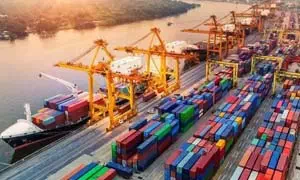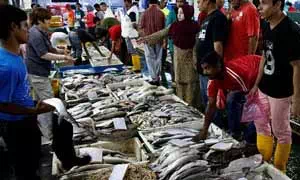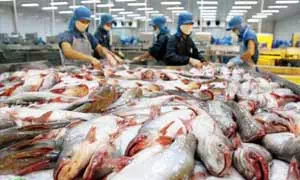Basic Food License
Basic registration is a type of food license issued by the Food Safety and Standards Authority of India (FSSAI) for small food businesses operating within a limited scale.
Read MoreState Food License
The State License is a type of food license issued by the Food Safety and Standards Authority of India (FSSAI) for medium-sized food businesses operating within a single state in India.
Read MoreCentral Food License
A Central License is a type of food license issued by the Food Safety and Standards Authority of India (FSSAI) for large-scale food businesses operating at a national level in India.
Read MoreFood License Renewal
Renewal of a food license refers to the process of extending the validity period of the existing Food license to continue conducting food-related activities legally.
Read MoreWelcome to FoodLicense.org.in! We are a newly launched website dedicated to helping food businesses obtain the necessary licenses and permits to operate legally in India.
MORE ABOUT US
Our Process
At FoodLicense.org.in, we work diligently to streamline the process of obtaining food licenses for businesses in India. Our approach is designed to provide a seamless and user-friendly experience for our clients. Here's how we work:
Information and Guidance
We offer comprehensive information on the different types of food licenses and permits required in India. Our platform provides detailed guidance on the application process, the necessary documents, and the legal requirements for obtaining food licenses.
Learn MoreStep-by-Step Assistance
We provide step-by-step assistance to our clients throughout the licensing process. Our team of experts is available to answer questions, provide support in filling out forms, and ensure that all requirements are met accurately and efficiently.
Learn MorePersonalized Support
We understand that every business is unique, which is why we offer personalized support to cater to the specific needs of our clients. Whether you are a small start-up or an established food business, we tailor our services to meet your individual requirements.
Learn MoreCompliance and Efficiency
Our goal is to help businesses achieve compliance with government regulations and maintain the highest standards of food safety. We work diligently to ensure that the licensing process is efficient, transparent, and hassle-free for our clients.
Learn MoreOngoing Support
Beyond the initial licensing process, we are committed to providing ongoing support to our clients. We are here to assist with any updates, renewals, or changes to licenses that may be required in the future.
Learn MoreFrequently Asked Questions
Steps involved in the food license registration procedure:
- Choosing the Type of Business
- Selecting the Food Category
- Determining the Type of License
- Completing the Documentation Process
The primary objective of every Food Business Operator is to uphold the standards of food quality, ensuring the safety and satisfaction of all consumers. The Food Safety and Standards Authority of India (FSSAI Registration) plays a crucial role in developing the necessary protocols for regulation.
Depending on the size of the food business, there are different types of FSSAI registrations offered.
- Basic Registration
- State License
- Central License
Small or petty FBOs can receive registrations if their annual turnover is less than Rs. 12 lakhs.
The Registering Authority, such as a Designated Officer or Food Safety Officer, grants these registrations.
The required files for registration include
Schedule-1 application is necessary for registration
An annual fee of Rs. 100/- is required
Proof of address and applicant's photograph are needed
If a Food Business Operator operates in multiple states, they must obtain a Central License for their registered Office/Head Office. Additionally, they need to obtain separate licenses/registrations for each unit based on the capacity/turnover from the relevant State/Central Licensing Authority.
The Licensing Officer has the authority to decline the application if the necessary information is not submitted within the designated 30-day timeframe.
FSSAI is the abbreviation for "Food Safety and Standard Authority of India." It is an independent organization under the Ministry of Health. Every individual or entity eligible for an FSSAI food safety registration or license must obtain FSSAI registration.
READ MORE REGISTRATION FAQ'S | READ MORE RENEWAL FAQ'S
Role of FoodLicense.org.in
A food license consultant plays a crucial role in assisting food businesses in obtaining and renewing their food licenses. These consultants are industry experts who have a deep understanding of food safety regulations, compliance requirements, and the application process for food licenses. Here are some key roles and responsibilities of a food license consultant:
APPLY FOR FSSAI
Expert Guidance
Food license consultants provide expert guidance on the different types of food licenses available (Basic Registration, State License, Central License) and help businesses determine the appropriate license based on their operations and scale.
Application Assistance
Consultants help food businesses fill out the required forms accurately, gather necessary documents, and submit the application to the Food Safety and Standards Authority of India (FSSAI) on behalf of the client.
Compliance Support
Consultants ensure that food businesses comply with all relevant food safety regulations, hygiene standards, and documentation requirements to meet the criteria for obtaining a food license.
Documentation Review
Consultants review and verify all the supporting documents provided by the food business to ensure they are complete, accurate, and in compliance with FSSAI regulations.
Liaison with Authorities
Consultants act as intermediaries between food businesses and the FSSAI authorities, facilitating communication, addressing queries, and coordinating any inspections or verifications required during the application process.
Renewal Assistance
Consultants also help food businesses in renewing their food licenses before the expiry date, ensuring continuity of operations and compliance with regulations.





 This registration ensures that hotels comply with the food safety and hygiene standards set by the FSSAI.
This registration ensures that hotels comply with the food safety and hygiene standards set by the FSSAI. Food license for online Home Kitchen is a mandatory requirement for individuals operating a home-based kitchen and offering food services through online platforms.
Food license for online Home Kitchen is a mandatory requirement for individuals operating a home-based kitchen and offering food services through online platforms. This registration is mandatory for businesses involved in the manufacturing, processing, packaging, or distribution of essential food products in India.
This registration is mandatory for businesses involved in the manufacturing, processing, packaging, or distribution of essential food products in India. The FSSAI Central Registration for Railway Premises pertains to the registration process specifically designed for railway premises in accordance with the regulations set by the Food Safety and Standards Authority of India (FSSAI).
The FSSAI Central Registration for Railway Premises pertains to the registration process specifically designed for railway premises in accordance with the regulations set by the Food Safety and Standards Authority of India (FSSAI).  Tea Powder Manufacturers are required to comply with the regulations set by the Food Safety and Standards Authority of India (FSSAI).
Tea Powder Manufacturers are required to comply with the regulations set by the Food Safety and Standards Authority of India (FSSAI).  The Food license for a Coffee Shop pertains to the process of obtaining a license from the Food Safety and Standards Authority of India (FSSAI) for operating a coffee shop .
The Food license for a Coffee Shop pertains to the process of obtaining a license from the Food Safety and Standards Authority of India (FSSAI) for operating a coffee shop . The Food license for Food Vending Machine pertains to the process of obtaining official recognition from the Food Safety and Standards Authority of India (FSSAI) for operating a food vending machine.
The Food license for Food Vending Machine pertains to the process of obtaining official recognition from the Food Safety and Standards Authority of India (FSSAI) for operating a food vending machine. Importers are required to obtain Food license in order to comply with the regulations set by the Food Safety and Standards Authority of India.
Importers are required to obtain Food license in order to comply with the regulations set by the Food Safety and Standards Authority of India. Food license for Herbalife Products pertains to the process of obtaining the necessary certification from the Food Safety and Standards Authority of India (FSSAI) for Herbalife products..
Food license for Herbalife Products pertains to the process of obtaining the necessary certification from the Food Safety and Standards Authority of India (FSSAI) for Herbalife products.. The Food license for Food Marketing Company pertains to the process by which a food advertising employer obtains certification from the Food Safety and Standards Authority of India (FSSAI)..
The Food license for Food Marketing Company pertains to the process by which a food advertising employer obtains certification from the Food Safety and Standards Authority of India (FSSAI)..  The Food license for Zomato, Swiggy, and Uber Eats pertains to the process by which these food delivery platforms comply with the regulations set by the Food Safety and Standards Authority of India (FSSAI)..
The Food license for Zomato, Swiggy, and Uber Eats pertains to the process by which these food delivery platforms comply with the regulations set by the Food Safety and Standards Authority of India (FSSAI)..  To obtain a food license for Foodpanda in India, you'll need to register your food business with the respective state or local authority..
To obtain a food license for Foodpanda in India, you'll need to register your food business with the respective state or local authority.. The Food license for Amazon and Flipkart sellers pertains to the mandatory requirement for these e-commerce platforms to ensure that the food products being sold on their platforms comply with the regulations set by the Food Safety and Standards Authority of India (FSSAI)..
The Food license for Amazon and Flipkart sellers pertains to the mandatory requirement for these e-commerce platforms to ensure that the food products being sold on their platforms comply with the regulations set by the Food Safety and Standards Authority of India (FSSAI).. The Food license for Online Sellers pertains to the mandatory requirement for online sellers to obtain a registration from the Food Safety and Standards Authority of India (FSSAI)..
The Food license for Online Sellers pertains to the mandatory requirement for online sellers to obtain a registration from the Food Safety and Standards Authority of India (FSSAI).. The Food license for Catering pertains to the process of obtaining a license from the Food Safety and Standards Authority of India (FSSAI) specifically for catering services..
The Food license for Catering pertains to the process of obtaining a license from the Food Safety and Standards Authority of India (FSSAI) specifically for catering services.. The Food license for Events Management pertains to the mandatory registration process required by the Food Safety and Standards Authority of India (FSSAI) for businesses involved in organizing and managing events..
The Food license for Events Management pertains to the mandatory registration process required by the Food Safety and Standards Authority of India (FSSAI) for businesses involved in organizing and managing events.. College Food license is a mandatory requirement for educational institutions to ensure the safety and quality of food served on their premises..
College Food license is a mandatory requirement for educational institutions to ensure the safety and quality of food served on their premises.. India is very much enriched by wide variety of fish resources. Thus the fish retailer business here also shows a high growth rate. FSSAI-Food safety license Registration..
India is very much enriched by wide variety of fish resources. Thus the fish retailer business here also shows a high growth rate. FSSAI-Food safety license Registration.. India is very much enriched by wide variety of fish resources. Thus the export from here to different countries also showing a high growth rate..
India is very much enriched by wide variety of fish resources. Thus the export from here to different countries also showing a high growth rate.. Agricultural products means crops, livestock and livestock products, including but not limited to field crops, fruits, vegetables, horticultural specialties..
Agricultural products means crops, livestock and livestock products, including but not limited to field crops, fruits, vegetables, horticultural specialties.. There are different types of chips available in market in different packing. Chips are very popular and demanded product among children's..
There are different types of chips available in market in different packing. Chips are very popular and demanded product among children's.. Coconut oil is one of the main commercial products in India today. It is made from the coconut fruit and its oil is said to be much better than groundnut oil to the health.
Coconut oil is one of the main commercial products in India today. It is made from the coconut fruit and its oil is said to be much better than groundnut oil to the health. Olive oil is a liquid obtained from (the fruit of Olea europaea; family Oleaceae), a traditional tree crop of the Mediterranean Basin. The oil is produced by pressing whole olives
Olive oil is a liquid obtained from (the fruit of Olea europaea; family Oleaceae), a traditional tree crop of the Mediterranean Basin. The oil is produced by pressing whole olives College Food license is a mandatory requirement for educational institutions to ensure the safety and quality of food served on their premises..
College Food license is a mandatory requirement for educational institutions to ensure the safety and quality of food served on their premises.. The Food license for E-Commerce FOBs pertains to the registration process required by the Food Safety and Standards Authority of India (FSSAI) for e-commerce platforms operating in the food and beverage sector..
The Food license for E-Commerce FOBs pertains to the registration process required by the Food Safety and Standards Authority of India (FSSAI) for e-commerce platforms operating in the food and beverage sector.. FSSAI (Food Safety and Standards Authority of India) registration is mandatory for pizza and sandwich outlets in India. FSSAI registration ensures that food is safe and hygienic for consumption..
FSSAI (Food Safety and Standards Authority of India) registration is mandatory for pizza and sandwich outlets in India. FSSAI registration ensures that food is safe and hygienic for consumption.. FSSAI registration is mandatory for all spices companies in India to ensure food safety and quality. The Food Safety and Standards Authority of India (FSSAI) is responsible for regulating and supervising the food business in the country..
FSSAI registration is mandatory for all spices companies in India to ensure food safety and quality. The Food Safety and Standards Authority of India (FSSAI) is responsible for regulating and supervising the food business in the country.. The Food license for Bar & Beverages pertains to the mandatory requirement for establishments in the bar and beverage industry to obtain a license from the Food Safety and Standards Authority of India (FSSAI)...
The Food license for Bar & Beverages pertains to the mandatory requirement for establishments in the bar and beverage industry to obtain a license from the Food Safety and Standards Authority of India (FSSAI)...
 The Food license for a Coffee Shop pertains to the process of obtaining a license from the Food Safety and Standards Authority of India (FSSAI) for operating a coffee shop..
The Food license for a Coffee Shop pertains to the process of obtaining a license from the Food Safety and Standards Authority of India (FSSAI) for operating a coffee shop.. The Food license for Vehicle Food Business pertains to the process of obtaining a license from the Food Safety and Standards Authority of India (FSSAI) for operating a food business that involves the preparation, storage, and sale of food products from a vehicle..
The Food license for Vehicle Food Business pertains to the process of obtaining a license from the Food Safety and Standards Authority of India (FSSAI) for operating a food business that involves the preparation, storage, and sale of food products from a vehicle.. The Food license for a Packaged Drinking Water Company is a mandatory certification required by the Food Safety and Standards Authority of India (FSSAI)..
The Food license for a Packaged Drinking Water Company is a mandatory certification required by the Food Safety and Standards Authority of India (FSSAI).. The Food license for a Juice Shop is a mandatory requirement imposed by the Food Safety and Standards Authority of India (FSSAI). This registration ensures that the Juice Shop complies with the food safety and hygiene standards set by the FSSAI. .
The Food license for a Juice Shop is a mandatory requirement imposed by the Food Safety and Standards Authority of India (FSSAI). This registration ensures that the Juice Shop complies with the food safety and hygiene standards set by the FSSAI. .